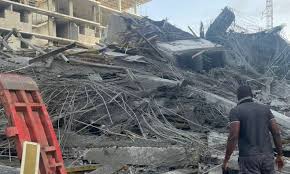The Permanent Secretary of the Lagos State Emergency Management Agency (LASEMA), Dr. Olufemi Oke-Osanyintolu, has urged property owners, landlords, and developers to follow building safety rules and obtain the right government approvals before starting construction. This appeal follows the latest building collapse in Ota Ona, Ikorodu, where lives were lost and others injured.
Dr. Oke-Osanyintolu made the statement during an on-the-spot visit to the scene of the collapsed building in the Ikorodu area of Lagos on Wednesday, 28th May 2025. He confirmed that 11 people were rescued alive while three others were unfortunately confirmed dead after the incident.
“We sympathize deeply with the families of those who lost their lives in this sad incident. We must all work together to stop these tragedies from happening again,” he said.
The LASEMA boss stated that, despite huge investment by the Lagos State Government in emergency response services and equipment, many developers and building owners still ignore safety guidelines. He explained that this negligence remains one of the leading causes of the frequent building collapses being recorded in Lagos State.
According to him, “Our emergency teams have been equipped and trained to respond quickly, but developers are not following the rules. This gap in compliance is what we are trying to close. If people obey building regulations, these disasters can be avoided.”
Dr. Oke-Osanyintolu emphasized that under the leadership of Governor Babajide Sanwo-Olu, the state has improved its emergency response systems and will continue to take steps to ensure safety across Lagos communities. He said the government will not hesitate to take strict actions against those who continue to put lives at risk by cutting corners in construction projects.
He also disclosed that nearby buildings affected by the collapse are being inspected, and integrity tests will be conducted to confirm if they are safe for people to live in.
“Disaster management is a shared responsibility. While the government is doing everything possible, residents must also play their part by reporting any signs of weak or dangerous buildings. We all must remain alert,” he added.
Speaking alongside the LASEMA team, Mr. Afinni Lateef, Secretary to the Ikorodu Local Government, said the council is already working with relevant authorities to inspect and report any distressed structures in the area. He assured residents that the local council will not delay in alerting safety agencies once any building is suspected to be unsafe.
Mr. Lateef also said the local government would visit the families of those who lost their lives to offer condolences and provide support. “This is a very painful time for the affected families. We are standing by them to offer support and sympathy,” he noted.
The Ota Ona building collapse has once again brought attention to the recurring issue of poor construction practices and weak enforcement of building codes in Nigeria’s commercial capital. In recent years, Lagos has witnessed several building collapses, resulting in multiple deaths and injuries. Experts have repeatedly warned that lack of building approvals, use of substandard materials, and inadequate supervision are major causes of these accidents.
Residents in Ikorodu and other parts of the state are now being urged to be more observant and quickly report any cracking walls, sinking buildings, or signs of instability to the Lagos State Building Control Agency (LASBCA) or LASEMA.
The Lagos State Government has restated its commitment to enforcing building regulations and holding violators accountable. Dr. Oke-Osanyintolu warned that unapproved constructions and ignored warnings will no longer be tolerated. He also urged community leaders to assist in monitoring their environments and report unsafe structures before disaster strikes.
As investigation continues into the cause of the building collapse, emergency officials have sealed off the site for safety reasons. Recovery efforts have ended, but cleanup and further inspections are ongoing.
With Lagos growing rapidly and housing demand rising, experts say there is a need for stronger collaboration between government agencies, private developers, engineers, and the public to ensure safe and stable housing for all.
